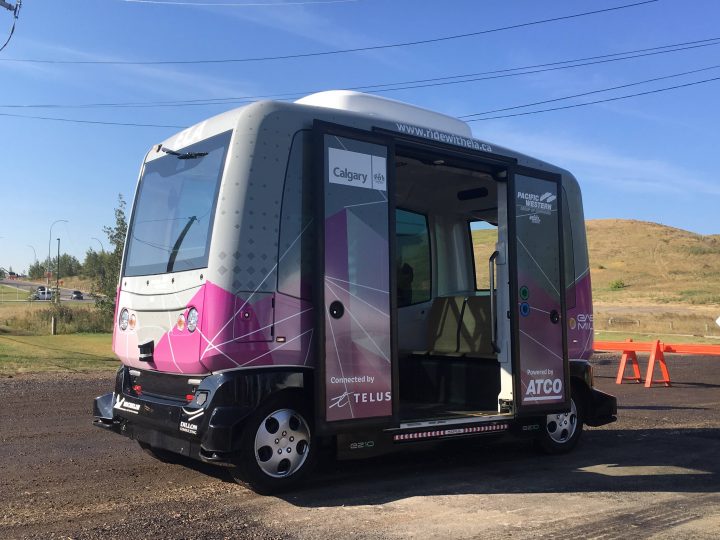A new self-driving shuttle bus connecting the Calgary Zoo and Telus Spark will begin taking passengers this weekend.

Dubbed “ELA” or “Electric Autonomous,” the month-long autonomous vehicle pilot project starts rolling Saturday. Federal and civic leaders were the first to test the shuttle on Wednesday.
Michael Thompson, general manager of transportation for the City of Calgary, noted the landmark arrival of ELA in the city.
“This ELA shuttle is the first fully-autonomous vehicle in the city of Calgary, and one of the first ones in Canada.
“Transportation has typically been driven in Calgary by ‘drivered’ cars. Our city has built out around that. And at the City of Calgary, we’re extremely excited and interested to see how autonomous vehicles will change the way that our city is built, shaped, and the way that people get to where they work, live and play.”
The driverless shuttles are capable of taking a dozen people between the two locations across Memorial Drive at a speed of 12 km/h on designated lanes closed to other vehicle traffic and pedestrians. The shuttle doesn’t have a steering wheel, instead using 3D sensors, high-accuracy GPS and cameras to guide it to its destination.
A public-private partnership, the ELA shuttle is sponsored by Pacific Western Transportation, Telus, Atco, with a $50,000 grant from the federal government’s Program to Advance Connectivity and Automation in the Transportation System.
LISTEN: Dan Finley of Pacific Western Group joins The Morning News to discuss ELA’s arrival in Calgary
The University of Calgary’s science faculty and Schulich School of Engineering will also be conducting research throughout the month-long trial.
University of Calgary associate professor Robert Ferguson will be doing research on pedestrian, cyclist and vehicle behaviour using distributed acoustic sensing (DAS) during the ELA project.
“About 15 per cent of traffic fatalities are pedestrians,” Ferguson told Global News. “So, if we can determine characteristics of cyclists, cars and pedestrians, could we envision a warning system in real-time? DAS data is so accurate and covers such an enormous distance, we feel that we might be able to do that.”
There will be no cost to passengers to take the shuttle, but rides do need to be booked online.
After the Calgary pilot project ends on Sept. 30, ELA will be moved to Edmonton for more testing in Alberta’s climate.
— With files from Reid Feist
- McLean accuses Calgary third-party advertiser of ‘whipping votes’ in favour of rezoning bylaw
- Canadian curler Chelsea Carey says don’t compare me to Jennifer Jones
- Firefighters battle blaze at vacant house in northwest Calgary
- 7 sent to hospital after carbon monoxide poisoning incident in northwest Calgary










Comments